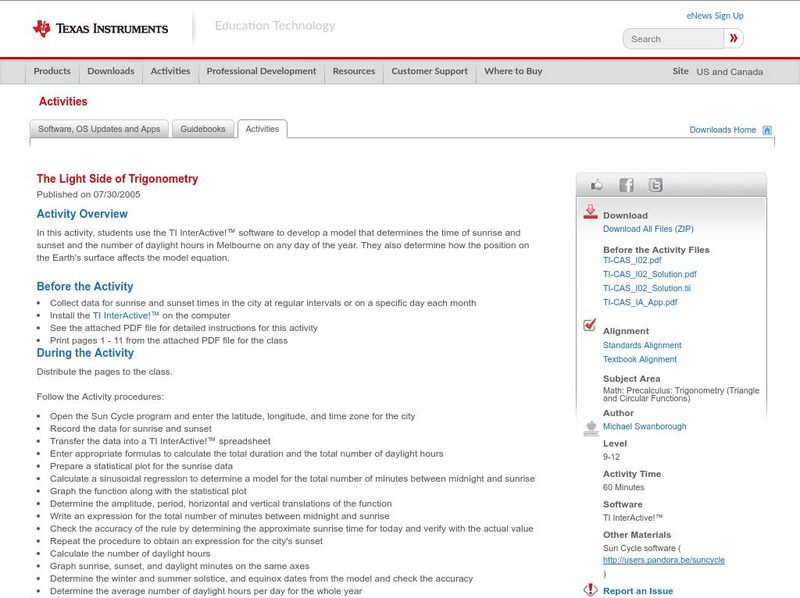Hi, what do you want to do?
Curated OER
How Does a Migration Move Forward?
Students record and examine migration data, and calculate how fast and far a migrating animal travels and what influences its progression. They utilize the Journey North website to follow their migrating animals.
Curated OER
Get Your Skates On
Students enjoy winter activities. In this field trip opportunities instructional activity, students may visit the Royal Botanic Gardens, Bocketts Farm, Clapham Common, or the Dinosaur Museum online or in-person.
Curated OER
The Solar System: Go Green with the Sun!
Third graders learn how to use solar power. For this sun, technology and energy lesson, 3rd graders learn how the solar power from the sun can give off energy, learn about solar panels, discuss their uses and benefits, and design a...
Curated OER
Ramadan
Students research Ramadan and festivals from other faiths using the religious festivals guide. They use information from the guide and Fatemeh's Press Pack to write a letter to the Football Association explaining why Abraham Moss...
Curated OER
Climatic Changes
In this climate changes worksheet, students review the different events such as volcanic eruptions and El Nino that change the climate. This worksheet has 5 multiple choice and 5 short answer questions.
Curated OER
Solar System: Let's Take a Trip
Third graders consider outer space. In this introductory solar system lesson, 3rd graders complete a KWL chart and listen to the story The Magic School Bus: Lost in the Solar System, by Joanna Cole & Bruce Degen. They will contribute...
Curated OER
Spring Vocabulary
For this spring vocabulary skills worksheet, students match the 10 season-related terms in the word bank to the appropriate definitions.
Curated OER
National Napping Day
In this National Napping Day worksheet, students complete activities such as reading a passage, phrase matching, fill in the blanks, choose the correct word, multiple choice, spelling, sequencing, scrambled sentences, asking...
Curated OER
Follow the Drinking Gourd
In this literature worksheet, 3rd graders refer to the book entitled Follow the Drinking Gourd. Students respond to 15 short answer reading comprehension questions.
Curated OER
Time Zones in the United States
Eighth graders explore how to use the time zones in the United States and internationally. They use elapsed time to solve problems. Students calculate the time in various places in the United States. They discuss the 6 time zones in the...
Curated OER
Day and Night
Third graders view a classroom simulation that demonstrates how the Earth's rotation creates day and night.
Curated OER
Fire, Rock and Water Volcanoes!
Students participate in a demonstration that helps them visualize mudflows and how they move. In this exploratory lesson students simulate a mudflow and create an avalanche.
Illustrative Mathematics
Illustrative Mathematics: F Tf Hours of Daylight 1
In order to determine how effective solar panels would be at various times of the year, it is important to know the amount of daylight at a given location. Students are asked to find an appropriate function that serves as a mathematical...
Youngzine
Youngzine: Week of 11 05 12: An Hour More of Zzzz's..yay!
On Sunday, November 4 at 2 a.m, clocks in U.S were set back by an hour as Daylight Savings came to an end. What is DST? Who first proposed the idea? Is it practiced around the world? Let's take a look in this video. [0:37]
Texas Instruments
Texas Instruments: The Light Side of Trigonometry
In this activity, students use the TI InterActive! software to develop a model that determines the time of sunrise and sunset and the number of daylight hours in Melbourne on any day of the year. They also determine how the position on...
Alabama Learning Exchange
Alex: Sun, Earth, and Moon: Calendar of Events
During this lesson students are going to take a look at moon phases and sunrise-sunset times in order to learn about daylight hours. Students discover that we do not always have the same amount of daylight each day. This lesson is best...
Other
Time and Date: Daylight Saving Time Dst
Daylight Saving Time is a way of making better use of the daylight in the evenings by setting the clocks forward one hour during the longer days of summer, and back again in the fall. To remember which way the clock goes, keep in mind...






















